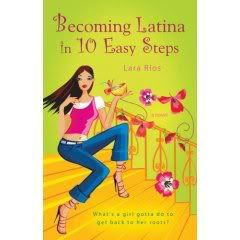Q&A with Lara Rios

1) Can you tell us a little about your current release?
Absolutely! BECOMING LATINA IN 10 EASY STEPS has been classified as chick-lit, but to me it's just a story about learning to be who you really are. I wrote Becoming Latina in response to hearing quite often from reviewers and readers that the books by Latino writers were not "Latino enough". A funny comment, because Latinos are such a varied group of people. What is very Latino for one group, may not be at all for another. So I created acharacter, Marcela, who must face this issue. She is not Latina enough for her family and decides to become so. In showing the way Marcela attempts to become a bunch of clichés and fails miserably, I hope to show in a comical way that we (all women, not just Latinas) are all individuals. Each person has to follow her own dreams and not let society, family, or friends influence or dictate who she should be.
Click here to read an excerpt of BECOMING LATINA
2) BECOMING LATINA IN 10 EASY STEPS is about finding your roots and discovering who you are. Is this a theme you have in other books, or how did you come up with this for this story?
Yes, it's definitely a theme in my stories. Maybe it's because it took me so long to figure out who I was and what I wanted from life. My family (dad) wanted a submissive, family centered daughter, society told me to toughen up. I was confused about whom to please. I found that many 2nd and 3rd generation ethnic-Americans face the confusion of living in two worlds at the same time. So I like to write about following your dreams and not allowing yourself to be pushed to be someone you're uncomfortable being.
3) NYT Bestselling thriller author Tess Gerritsen recently posted on her blog about race and best-sellerdom, offering the opinion that as, a ChineseAmerican, in order to reach the level of success she strived for, she needed to be marketed and defined not as a Chinese American, but simply as a thriller writer, leaving her race out of the equation both as an author and in the race of her main characters. You and your publisher have obviously taken the opposite approach, embracing the Latino heritage of your characters and your stories. What kind of process did you and your publisher go through in determining the platform for your stories? Was it a difficult choice to make? What are your thoughts on this subject?
Wow, well, how do I answer this question? My feeling is that Latinos have been stereotyped quite a bit. Much of what has been published was from the1970's seemed to be political statements about the struggles of Chicanos in America. I wanted to take many of the stereotypes out there and say that we haven't all experienced the same thing. In my book, I attempted to populate it with different "groups". The rich Latinos, the middle class, the gang member, the political activist, the Latino who is simply an American and could care less about her roots. My editor is Chinese and she told me that when she read the manuscript, she could totally relate to theheroine. So, yes, I am embracing my heritage, but more than that, I'm saying, "hey, guys, stop with the stereotypes." Take a real look, we Latinos are just like you. We don't all speak Spanish, can't all dance, don't all cook wonderful meals, and some of us have never stepped foot anywhere outside the United States. So our platform, if we have one, is to bring attention to our heritage, but to make everyone aware that our ethnicity is only one small part of the whole person.
4) What's the best part about being an author?
Freedom. Working anywhere -- home, a coffee shop, or on vacation. Also, I think it gives me the chance to reach many people and perhaps make a difference in someone's life. I was a teacher for lots of years and loved it for the same reason.
5) What's the coolest/weirdest reader letter/email you've ever received?
It was from a little boy who wrote to tell me how much he loved my books and how they touched him. I was stunned. Could a little boy have read my romances, I wondered. I received about three more emails from children, and was baffled. So, I looked up the book they were referring to and found that there is a children's author who is also named Lara Rios. She lives in Central America. Lara and I have since emailed each other and I forward her any mail I mistakenly get for her. Pretty funny.
6) Can you give us a sneak peek at your next book?
Of course. It's called BECOMING AMERICANA, and it basically takes theopposite view from BECOMING LATINA. In BECOMING AMERICANA, the heroine, Lupe, wants to leave her roots behind and become Americanized, but keeps getting pulled back in by her family and her own insecurities. Her challenge is to recognize that she doesn't have to choose one or the other. She can be both American and Latina. Lupe is a secondary character in BECOMING LATINA. After this, I'll probably leave the Latino issue alone : )
Thanks! Nice chatting with you!
Lara Rios
www.lara-rios.com
BECOMING LATINA IN 10 EASY STEPS, Available now!

0 Comments:
Post a Comment
<< Home